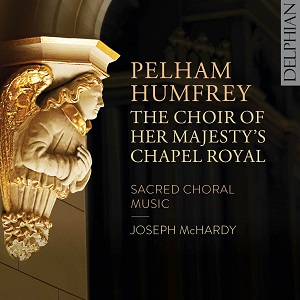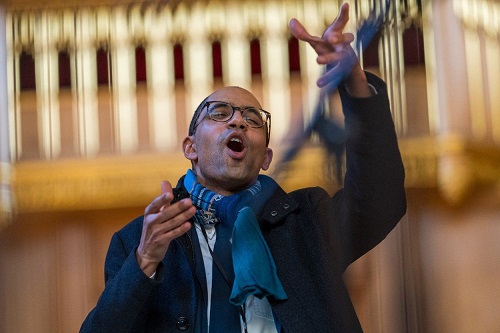Until just recently the church music of Pelham Humfrey (1647/8-74) was represented on disc with just two dedicated recordings: one from 1992 with the Choir of Clare College, Cambridge (Nicholas McGegan/Harmonia Mundi), the other, just over a quarter of a century later by the one-to-a-part Oxford Consort of Voices (Higginbottom/Pan Classics). Individual anthems and devotional songs have, of course, appeared in anthologies. So, it is entirely fitting for the Choir of her Majesty’s Chapel Royal, St James’s Palace, where Humfrey was a chorister and later Master of the Choristers, to provide this snapshot of a much neglected and short-lived Restoration composer.
Born during the English Civil War, Humfrey’s early years saw the transfer from Commonwealth to Restoration, and after being one of the first set of children under Henry Cooke at St James’s Palace he studied in France and Italy, returning to England to become a Gentleman of the Chapel Royal. Aged twenty-five he became Master of the Children there and died prematurely a year later. Within little more than a decade, his music (a synthesis of French and Italian styles) was to influence the next generation of Restoration composers including the better-known Henry Purcell. Indeed, his symphony anthems were to become a defining feature of the music for the royal household until the end of the 17th century. One can only guess how Humfrey’s music might have developed had he lived longer.

There’s no doubting the composer’s precocious gifts, but in his own day Humfrey’s arrogance and vanity offended the diarist Samuel Pepys who claimed he ‘disparages everybody’s skill but his own’. He may have been a dandy, but the works on this new disc make clear his mastery of word setting especially in the extensive symphony anthems which reveal a sensitivity to accentuation, numerous expressive turns of phrase and an ear for the emotive power of chromatic harmony. This is amply demonstrated here in the three string-accompanied anthems in which the Chapel Royal Choir are joined by four distinguished solo voices whose declamatory style veers towards the theatrical.
In some ways that’s no bad thing and since these works showcase the solo voice, one wants a soloistic performance. In this respect I particularly enjoyed the contributions made by Ashley Riches in By the waters of Babylon whose smooth-as-silk rendition of Humfrey’s plaintive phrases seemed to fit the Psalmist’s words like a glove. His declamatory singing at ‘Remember the children of Edom’ is wondrously exaggerated and echoes the Italianate manner Humfrey is supposed to have heard on his continental travels. Yearning for Jerusalem, tenors Nicholas Mulroy and Nick Pritchard make the most of their expressive duet with plenty of decorative figuration of their own and the choir add their own lamentation, though I hear little sense of determination to vanquish their enemies. A telling use of dissonance makes its presence felt too in the string passages.
The choir (six men and ten boys) can be heard to better advantage in the more positive mood of O give thanks unto the Lord where the trebles sing with considerably more lustre, perhaps energised by Humfrey’s dancing rhythms and some sprightly string playing – both reminders of the French court. A tenor duet recalls the Italian influence; Mulroy and Pritchard ‘s florid elaborations made me search the booklet notes (in vain) for details of the edition since much of their flamboyant singing bears little relation to Peter Dennison’s 1972 version for Musica Britannica. That’s not a criticism, merely an indication of how lively these performances are, where both tenors ‘spring clean’ the music and steal a march on the more polite, but no less polished soloists John Potter and Rogers Covey Crump in the McGegan recording.

The emotional torment of Jesus’s last days is compellingly explored in O Lord my God where Riches inhabits the suffering of Christ to perfection. Recurring verse and chorus passages heighten the drama of the Lenten agony in an anthem that comes even closer to Italian theatrical models. If only the same degree of vocal intensity was generated by the choir, this ‘mini drama’ would be a very special account. Yet what a superb piece this is: cathedral organists should consider this work an essential part of Holy Week.
In a more restrained idiom are Humfrey’s English-sung liturgical settings, where ensemble passages for solo voices alternate with mostly chordal and syllabic full choir sections. I’m not entirely convinced by the use of a high tenor voice taking the alto part in trio passages for upper voices and while this may follow French period practice in its use of the haute-contre, a too prominent tenor in the ‘Te Deum’ and ‘Jubilate’ becomes wearing. Not so Alexander Chance (countertenor) who makes welcome appearances in these works, as does Alex McCartney’s dulcet theorbo, occasionally pricking the ear within his continuo duties with Martyn Noble.
The music for the Communion setting is similarly functional, and those of a certain age who know their 1662 Book of Prayer will recognise the words of the ‘Kyrie’ (drawn from the Ten Commandments), understand the abbreviated ‘Sanctus’ (without the ‘Benedictus’) and might recall from church attendance the positioning of the ‘Gloria’ at the end of a service. Interestingly, the Alternative Service Book (ASB) was the first complete prayer book produced by the Church of England since 1662.
In conclusion, these historically aware performances make for highly agreeable listening, and are endowed with abundant enthusiasm from the Chapel Royal singers, much sensitivity from Bojan Čičić and his fellow string players and terrific flair from four stylish soloists.
David Truslove
Alexander Chance (countertenor), Nicholas Mulroy (tenor), Nick Pritchard (tenor), Ashley Riches (Bass), Bojan Čičić, Elin White (violins), Jane Rogers (viola), Sarah McMahon (cello), Alex McCartney (theorbo), Martyn Noble (organ) Joseph McHardy (organ & musical director), the Choir of her Majesty’s Chapel Royal, St James’s Palace.
Pelham Humfrey, Sacred Choral Music: O give thanks unto the Lord, Morning Service in E minor, Communion Service in E minor, By the waters of Babylon, Evening Service in E minor, O Lord my God.
DELPHIAN DCD34237 [59.02]